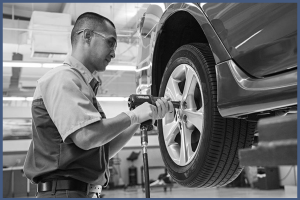Get Pre-Approval Now
- We Buy Cars!
- Click Here!
 Squeaking brakes can be scary. You might even think that your brakes are about to fail. This noise is disturbing, but you’re not in immediate danger. This noise does, however, mean there’s a problem that has to be fixed. As your used car dealer in Pulaski, VA, we want to tell you some of the issues that can cause this noise and how we can fix the problem for you.
Squeaking brakes can be scary. You might even think that your brakes are about to fail. This noise is disturbing, but you’re not in immediate danger. This noise does, however, mean there’s a problem that has to be fixed. As your used car dealer in Pulaski, VA, we want to tell you some of the issues that can cause this noise and how we can fix the problem for you.
Worn Brake Pads
Brake pads are small components in your brake system that allow your car to stop quickly and easily. The pads fit into the wheel calipers, and they have a thick friction material covering. When you hit the brakes, the calipers are forced against the rotors. The brake pad’s friction coverings generate friction against the smooth rotors, and this brings your wheels to a stop.
Each time you brake, some of the friction material covering wears off. When a pad has lost most of this covering, a metal spike becomes visible in the remaining material. The next time you brake, the spike will scratch against the rotor and produce a squealing or squeaking noise. When you hear this sound, it’s time to visit us for new pads. Once the pads are replaced, the noise will cease.
Moisture on the Pads
Squeaking noises from your brakes early in the morning might not be a problem. Rain or snow overnight, or early morning humidity can cause moisture to build up on the rotors. The rotors are the smooth metal disks located behind your wheels. The moisture can cause a thin layer of rust to build up on the rotors.
If this has happened, the friction material on the pads will grind against the rust layer and make a squeaking noise when you brake. It will make a similar sound to the door in your house with the slightly rusted hinges that you keep meaning to oil. If the squeaking persists, our technicians need to examine your rotors. They could have a more serious case of rust that we need to remove to fix this problem.
Fast Braking
If you often have to ride your brakes, for example driving down a winding road, or if you repeatedly brake fast, this can cause a change in your brake pads. In both these situations, your brake pads are kept in contact with the rotors for prolonged periods. This can make the pads develop a smooth, glass-like surface, which is known as glazing.
A glazed pad is dangerous, as it doesn’t provide the friction necessary to stop the rotor. When a glazed pad connects with the rotor, it makes a squeaking noise. We’ll examine your pads and replace any glazed ones.
We can fix that annoying squeaking sound. Visit our service department today at Duncan Suzuki.



